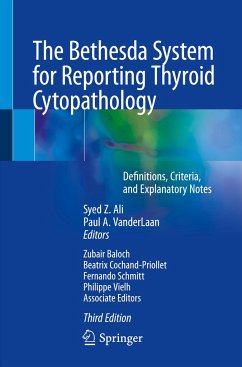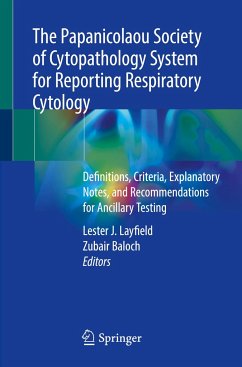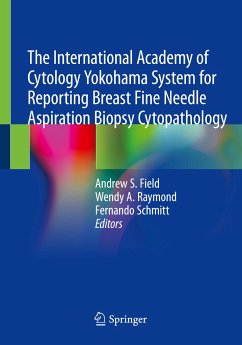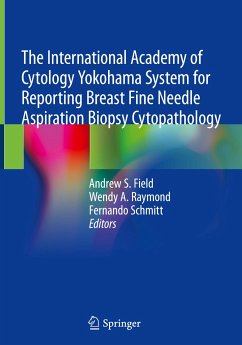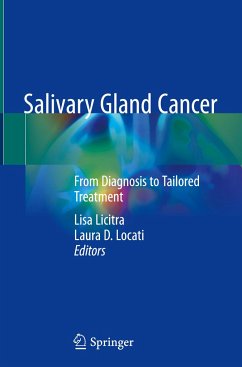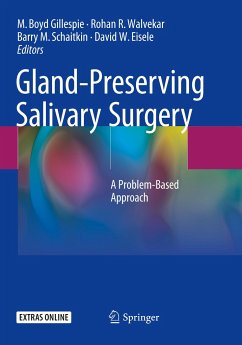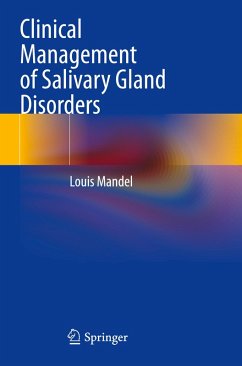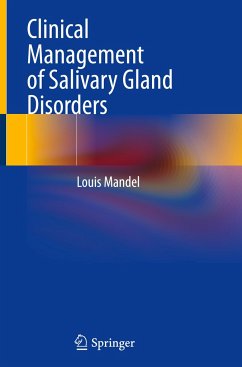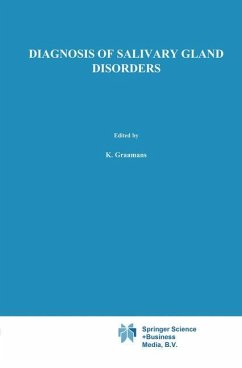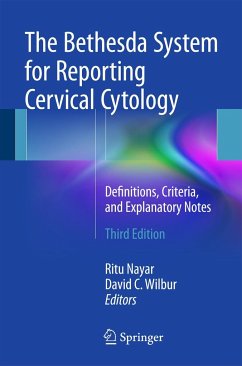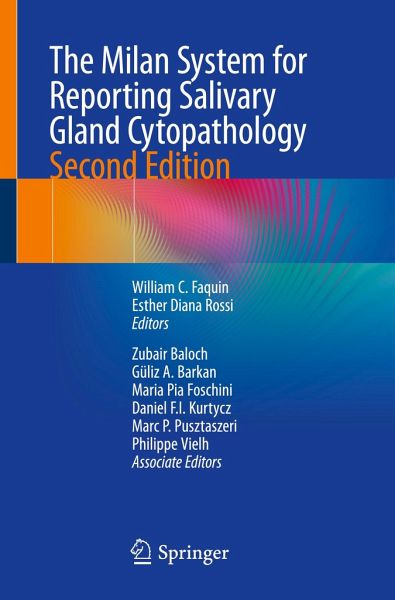
Broschiertes Buch
The Milan System for Reporting Salivary Gland Cytopathology
Versandkostenfrei!
Versandfertig in 1-2 Wochen
Weitere Ausgaben:

PAYBACK Punkte
32 °P sammeln!




The Second Edition of The Milan System for Reporting Salivary Gland Cytopathology, like the First Edition, represents a collaborative effort by a multidisciplinary group of cytopathologists, surgical pathologists, molecular pathologists, radiologists, and head and neck surgeons. This international group shares the goal of creating a practical and uniform reporting system for salivary gland fine needle aspiration (FNA). This book is organized into six general diagnostic categories: "Non-Diagnostic," "Non-Neoplastic," "Atypia of Undetermined Significance (AUS)," "Neoplasm: Benign," "Neoplasm: Sa...
The Second Edition of The Milan System for Reporting Salivary Gland Cytopathology, like the First Edition, represents a collaborative effort by a multidisciplinary group of cytopathologists, surgical pathologists, molecular pathologists, radiologists, and head and neck surgeons. This international group shares the goal of creating a practical and uniform reporting system for salivary gland fine needle aspiration (FNA). This book is organized into six general diagnostic categories: "Non-Diagnostic," "Non-Neoplastic," "Atypia of Undetermined Significance (AUS)," "Neoplasm: Benign," "Neoplasm: Salivary Gland Neoplasm of Uncertain Malignant Potential (SUMP)," "Suspicious for Malignancy," and "Malignant." It includes definitions, morphologic criteria, and explanations for each of the diagnostic categories. Specific chapters are dedicated to the application of the latest available ancillary studies, radiologic features of salivary gland lesions, clinical management, and histological considerations including updates from the most recent 5th Edition WHO blue book.
The Milan System for Reporting Salivary Gland Cytopathology 2nd Edition represents an essential step towards increasing the overall effectiveness of salivary gland FNA and fostering better communication between clinicians and between institutions to improve overall patient care.
The Milan System for Reporting Salivary Gland Cytopathology 2nd Edition represents an essential step towards increasing the overall effectiveness of salivary gland FNA and fostering better communication between clinicians and between institutions to improve overall patient care.
Dr. William C. Faquin is the Chief of Otolaryngologic Pathology at the Massachusetts Eye and Ear and a subspecialist in Head and Neck Pathology & Cytopathology at the Massachusetts General Hospital in Boston. He is a Professor of Pathology at Harvard Medical School, and is recognized for his contributions to the study of thyroid, salivary gland, and HPV-related cancers of the head and neck. He has authored over 350 peer-reviewed publications, and has co-authored several books on head and neck cytohistology, salivary gland cytopathology, and thyroid cytopathology. Dr. Faquin is the Editor-in-Chief for Cancer Cytopathology which is one of the 3 journals of the American Cancer Society, he is an author of the upcoming ARP Fascicle for Upper Aerodigestive Tract Tumors, co-author of the Bethesda System for Reporting Thyroid Cytopathology, co-chair of the College of American Pathologists Evidence-Based Guidelines Committee for the testing ofhead and neck squamous cell carcinomas for high-risk HPV, and co-editor of the Milan System for Reporting Salivary Gland Cytopathology sponsored by the ASC and IAC. Dr. Esther Diana Rossi received an MD followed by a residency in Anatomic Pathology and a PhD from the Catholic University in Rome, Italy. She was an international observer in surgical pathology and cytopathology at the University of Pennsylvania and Hahnemann University (both in Philadelphia), Gustave Roussy (Paris), and the Institute of Molecular Pathology and Immunology of the University of Porto (IPATIMUP). Dr. Rossi is currently the Director of Cytopathology and Endocrine Pathology at the Fondazione Policlinico Universitario Agostino Gemelli IRCCS and an Associate Professor of Pathology at Catholic University, also with the title of Full Professor. She has published more than 200 original articles, reviews, and book chapters on endocrine pathology, cytology, and head and neck pathology. Dr. Rossi has co-authored 6 books and served as co-editor of the Milan System for Reporting Salivary Gland Cytopathology, as well as for the upcoming second edition. She also served as one of the three lead authors for the revisions to the Bethesda Thyroid FNA Classification System second edition and is the lead author for the chapter on undifferentiated carcinoma for the upcoming third edition. Dr. Rossi contributed chapters to the WHO Classifications of Endocrine and Neuroendocrine Tumors, Head and Neck Tumors, Pediatric Tumors, and Tumors of Hematopoietic and Lymphoid Tissues. She has delivered numerous lectures, workshops, and short courses at national and international meetings including USCAP, ASC, ASCP, CAP, ECC, ICC, ESP, IAP, and SIAPEC. Dr. Rossi is Associate Editor of Cancer Cytopathology and a member of the editorial boards of Diagnostic Cytopathology, Cytojournal, Acta Cytologica, PLOS One, Endocrine Pathology , and the Journal of the American Society of Cytopathology. She serves on the executive board of the Papanicolaou Society, the Scientific Committee of the EFCS and the abstract review board for the USCAP. Dr. Rossi has received awards from the Italian Society of Pathology, the American Society of Cytopathology, and the Italian Cancer Program-AIRC. Dr. Zubair Baloch received his medical degree from Liaquat Medical University in Hyderabad, Sind, Pakistan. After receiving his PhD in 1991 he joined the pathology residency at Hahnemann University Hospital. This was followed by fellowships in surgical pathology at Memorial Sloan Kettering Cancer Center, New York and cytopathology at the University of Pennsylvania Medical Center, Philadelphia under the mentorship of Dr. Prabodh K. Gupta (past president ASC). Dr. Baloch began his career as an assistant professor in the Department of Pathology & Laboratory Medicine at UPENN medical center in1997and is currently a professor of pathology and laboratory medicine there. He has authored more than 200 peer reviewed publications in leading pathology and Endocrine journals on the subject of endocrine and head and neck pathology; and book chapters and monographs. Dr. Baloch has delivered numerous lectures, workshops and short courses both at the national and international meetings including ASC, USCAP, ASCP, CAP, ECC, IAC and IAP. Dr. Baloch has coauthored 3 books and has served as co-editor of the most recent "Milan System for Reporting Salivary Gland Cytopathology". Dr. Baloch has also served as the chair of the terminology and morphologic criteria committee of the 2007 NCI sponsored thyroid FNA initiative which led to the development of "Bethesda Thyroid FNA Classification Scheme". Dr. Baloch also served on the international panel which recommended the renaming of encapsulated follicular variant of papillary thyroid carcinoma to non-invasive follicular tumor with papillary like nuclear features (NIFTP) and the current WHO editorial board of classification of thyroid neoplasms. Dr. Baloch is chief editor of Diagnostic Cytopathology and member of the editorial board of Cancer Cytopathology, Cytojournal, Endocrine Pathology and Journal of American Society of Cytopathology. Dr. Baloch has served as the chair of ASCP annual meeting scientific program committee (2014-2018), member of Papanicolaou Society scientific program committee, USCAP education committee, ASC executive board and chair of the annual meeting scientific program committee, ASCP committee for continuing professional development, American Association of Endocrinologist thyroid nodule guideline task force, USCAP board, American Thyroid Association laboratory test committee and well-differentiated thyroid carcinoma management guidelines committee. Dr. Baloch's awards include University of Pennsylvania Peter Nowell, Kevin Salhany and Best Graduate Student educator awards, ASCP President, Best educator and Arthur Purdy Stout lectureship award and ASC President's service Award. Dr. Güliz A. Barkan, M.D., FIAC is a board certified Anatomic Pathologist and Cytopathologist, Professor of Pathology and Urology, and currently the Director of Cytopathology, and the Director of the Cytopathology Fellowship Program at Loyola University Medical Center, Maywood, IL. Dr. Barkan received her medical degree from Marmara University School of Medicine in Istanbul, Turkey in 1995. She completed residency in Anatomic and Clinical Pathology at the University of Michigan, Ann Arbor, Michigan in 2001. She finished a Surgical Pathology fellowship in the same institution in 2002 and a Cytopathology fellowship at the University of Texas, M.D. Anderson Cancer Center, Houston, Texas in 2003. After a brief period in private practice in Turkey, she joined Loyola University Department of Pathology and Laboratory Medicine in February 2006, and has been there since then. She has held various intradepartmental and national leadership positions such as founder of the medical student interest group in pathology "SCOPE", director of the pathology residency program, vice chair of education, etc. Her interests include cytopathology and surgical pathology of the genitourinary tract, and pathology education. She has authored a number of peer-reviewed publications, abstracts, chapters, and given national and international invited talks and workshops in her fields of interest. Dr. Barkan is a fellow of the International Academy of Cytology, and has served as a member on both the American Board of Pathology, Test Development committee and the College of American Pathologists Cytopathology committee. Dr. Barkan is a past president of the American Society of Cytopathology. Dr. Maria Pia Foschini, M.D is a certified Anatomic Pathologist, Professor of Anatomic Pathology, Director of the School of Anatomic Pathology at the University of Bologna (Italy) and Director of the Unit of Anatomic Pathology at Bellaria Hospital, Bologna (Italy). Dr. Foschini received her medical degree from Bologna University School of Medicine in Bologna, Italy in 1985. She completed residency in Anatomic Pathology at the University of Bologna (Italy) in 1989. In 1990 she joined the Unit of Anatomic Pathology at Bellaria Hospital (Bologna) and has been there since then. She has held various local and National leadership positions such as director of the pathology residency program (from November 2013 till March 2023), coordinator of the Italian Group on Head and Neck Pathology (Section of the Italian Society of Anatomic Pathology), director of the University Medical Library, etc. Her interests include cytopathology and surgical pathology of the head and neck and breast, and pathology education. She has authored a number of peer-reviewed publications, abstracts, chapters, and given national and international invited talks and workshops in her fields of interest. Dr. Foschini is a fellow of the European Society of Pathology and Italian Society of Pathology and serves as reviewer and editorial board of several National and International journals (as Virchows Archiv, European Journal of Surgical Oncology, Human Pathology, Pathologica, Turkish Journal of Pathology, etc). Dr. Daniel F.I. Kurtycz, M.D., is a recently retired Professor in the Department of Pathology and Laboratory Medicine, at the University of Wisconsin-Madison School of Medicine and Public Health. He served as the Medical Director of the Wisconsin State Laboratory of Hygiene (WSLH), the state's public health laboratory. He received his medical degree from the University of Michigan in 1976 and served his pathology residency at the University of Wisconsin-Madison. In 1985 he took over the directorshipof the UW-Madison Cytology Laboratory and the School of Cytotechnology from Dr. Stanley Inhorn at the WSLH. In 1987 he established the University of Wisconsin FNA Service and the UW Cytopathology Fellowship. He also directed the General Pathology Course for the University of Wisconsin School of Medicine (1990-2001). Regarding National Service Dr. Kurtycz: 1) served two terms as Secretary Treasurer of the American Society of Cytopathology; 2) is Past-President of the American Society of Cytopathology 2020; 3) served 7 years as a member of the Cytopathology Test Development Committee of The American Board of Pathology; 4) served for 9 years on the American Society for Clinical Pathologists Board of Registry for Cytology; 5) served for 7 Years on the CAP Cytopathology Committee; 6) is the Current President of the History of Pathology Society (www.hps.wisc.edu) At the WSLH Dr. Kurtycz directed the sections of Cytology, Cytogenetics, Biochemical Genetics and Newborn Screening. He was part of the surgical pathology team specializing in Breast/GYN at the University of Wisconsin Hospitals and Clinics. Dr. Marc Pusztaszeri obtained his medical degree from University of Lausanne, Switzerland, in 2001. He then completed a six years residency program in Pathology at CHUV, Lausanne, Switzerland. He then practiced mainly at Geneva University Hospitals, where he developed his current specialization of head and neck pathology, thyroid pathology, and cytopathology. In 2011-2012, he did a visiting fellowship at the department of Pathology, MGH, in Boston. In 2017, he joined the department of Pathology of McGill University in Montreal where he is currently Associate Professor. His clinical and research interests have focused mainly on cytopathology and surgical pathology of the thyroid and salivary glands. He has authored or co-authored over 120 peer-reviewed publications and has contributed to at least 15chapters from reference textbooks for thyroid and salivary gland cytopathology, including the Bethesda System for Reporting Thyroid Cytopathology and the Milan System for Reporting Salivary Gland Cytopathology. He serves as an editorial board member for several important journals in the field of cytopathology, head and neck pathology as well as for Pathology Outlines, and as an ad hoc peer-reviewer for many other journals. Philippe VIELH MD, PhD, FIAC Dr. Philippe Vielh directed the cytopathology unit at Institut Curie (Paris, France) for 13 years before moving to Gustave Roussy comprehensive cancer center (Villejuif, France) where he headed the cytopathology unit (2003-2015), the histocytopathology unit of the translational research laboratory (2007-2014), and the institutional biobank (2011-2014). He then worked (2015-2019) at the Laboratoire National de Santé (Dudelange, Luxembourg) where he was mainly in charge of cytopathology.He is now working at Medipath and the American Hospital of Paris (France). Dr Vielh is interested in the study of omics of breast and thyroid tumors. He has authored more than 330 articles in peer-reviewed journals, 7 books and 30 book chapters. Philippe Vielh is currently the Editor-in-Chief of the journal Cytopathology since January 2021, Associate Editor of the Journal of Molecular Pathology since July 2020 and has been the series' Editor of the Karger book collection entitled ' Monograph in Clinical Cytology ' between 2016 and 2020. He is on the editorial board and reviews for Diagnostic Cytopathology, Cancer Cytopathology, Journal of the American Society of Cytology. He is member of the American Society of Cytopathology (ASC) and holds a number of national and international society memberships including the fellowship of the International Academy of Cytology (FIAC). Philippe was honored to serve as President of the French Society of Cytology (SFCC) for 9 years (1996-2006), President of the 31st European Congress of Cytology in 2005 (Paris, France) and Secretary General of the European Federation of Cytology Societies (EFCS) for 7 years (2005-2012). He chaired the 18th International Congress of Cytology in Paris (May 2013), was President of the International Academy of Cytology (IAC) for 3 years (May 2013-June 2016) and then IAC Past-President until May 2019. He is now Chair of the European Society of Pathology (ESP) Cytopathology Working Group since 2018. Philippe is a Professor of Pathology affiliated at the Faculty of Medicine of the University of Porto (Portugal) since December 2017. He is recipient of the 2007 Papanicolaou Society of Pathology's L.C. Tao "Educator of the Year" Award, the 2016 International Academy of Cytology's Maurice Goldblatt Award and the 2019 American Society of Cytopathology's International Achievement Award.
Produktdetails
- Verlag: Springer / Springer International Publishing / Springer, Berlin
- Artikelnr. des Verlages: 978-3-031-26661-4
- 2. Aufl.
- Seitenzahl: 260
- Erscheinungstermin: 27. Juni 2023
- Englisch
- Abmessung: 235mm x 155mm x 14mm
- Gewicht: 447g
- ISBN-13: 9783031266614
- ISBN-10: 3031266617
- Artikelnr.: 67266577
Herstellerkennzeichnung
Springer-Verlag GmbH
Tiergartenstr. 17
69121 Heidelberg
ProductSafety@springernature.com
Für dieses Produkt wurde noch keine Bewertung abgegeben. Wir würden uns sehr freuen, wenn du die erste Bewertung schreibst!
Eine Bewertung schreiben
Eine Bewertung schreiben
Andere Kunden interessierten sich für


